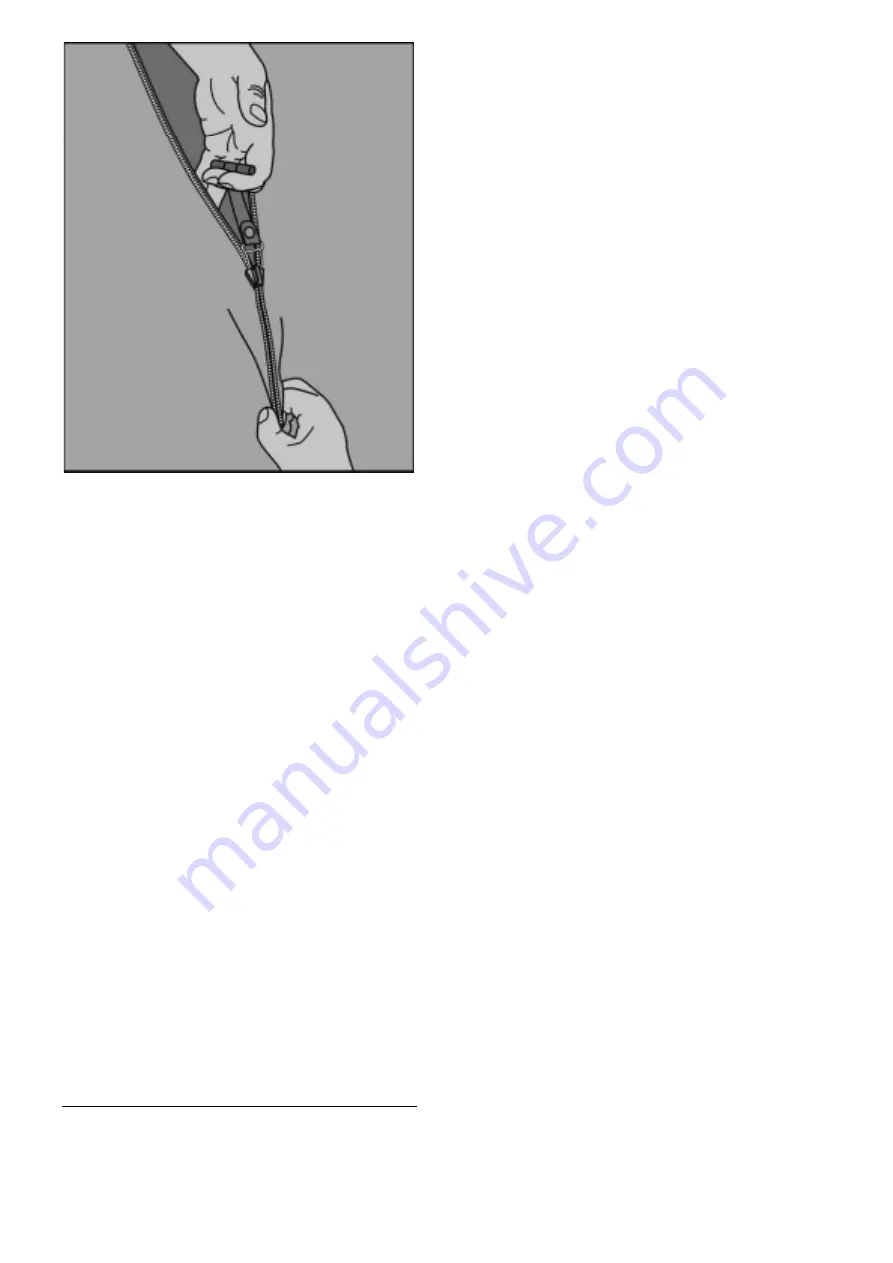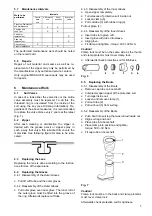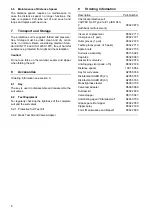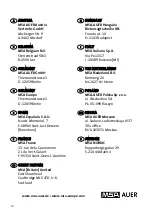
6
Fig. 5:
Pull up zipper without unnecessary force, a section
at a time, stretching the zipper with one hand while
slowly pulling up the fastener with the other hand.
Pull fastener toggle only in a plane with the suit sur-
face. Pull toggle as flat as possible.
Attention
!
Never force the two zipper halves together through
stronger pulling. A forcible closing may permanently
damage the zipper which could cause it to break
open during use. If there is an increasing force or
blocking of the fastener while closing the zipper,
check whether the zipper is lubricated well or con-
taminants are blocking a further closing of the zip-
per. In this case pull back fastener, remove the
causing trouble and close again slowly.
4.3
Removing the Protective Suit
If the suit is heavily soiled, a preliminary cleaning
should be done while it is still on the man. This is
done with water and, if necessary, with detergent
additives. Care must be taken that any assistant is
wearing proper personal protective equipment, e. g.,
protective gloves, respiratory protection, protective
clothing.
When removing the protective suit, avoid contact
with the soiled outside of the suit
4.4
Disposal of Contaminated suits
Depending on the chemicals they were exposed to,
contaminated suits must be disposed observing
existing legislation regarding toxic waste.
5
Care and Maintenance
5.1
Cleaning
The protective suit must be cleaned after each use.
To do this, remove the valve discs of the suit and
unbutton the back reinforcement. These parts must
be cleaned separately and are fitted back only after
they have been dried.
If the suit is not too badly soiled, it is washed once in
water at +30 °C to which a smooth detergent has
been added. If it is badly soiled the procedure is
repeated. Following this it is rinsed twice in clear
water.
In case other detergents or processes are to be
used, their suitability must be confirmed by the de-
tergent manufacturer.
Afterwards the opened suit is hung up by the boots.
The protective suit and the removed parts must not
be dried in radiant heat (sun-light, radiator). When
using a drying cabinet the temperature must not
40 °C. After the protective suit has been
cleaned, the zipper must be cleaned separately with
water and a brush or paintbrush removing all foreign
objects like bristles, hairs, threads etc. Never
scratch clean with hard or sharp objects.
5.2
Disinfection
After cleaning, the suit should be disinfected using
e. g.
»
AUER 90
«
disinfectant (see Ordering Infor-
mation).
Observe the Instructions for Use of the disinfectant.
5.3 Maintenance
After each use or cleaning and regularly every six
months a pressure/tightness test of the suit, the
mask and the suit valves must be made using the
MSA AUER suit test kit and mask test kit. For further
maintenance work see section 6.
5.4
Tightness Test of the Protective Suit
(Maintenance Check)
To inflate the protective suit, use only compressed
air that is clean and free from oil.
x
Inflate suit to 16 mbar.
x
Stabilizing time 3 min.
x
Reduce pressure to 18 mbar (test pressure).
x
Maximum permissible pressure drop in 3 min
2 mbar.
At the end of the test, reassemble the valve discs
and valve covers.
Valve tightness test see section 6.1.
Note:
In order to avoid erroneous readings, the test
should be conducted in a room free of draft.
5.5
Checks in Case of Leaks
x
Are the test connections tight?
x
Is the zipper completely closed?
x
Are the valve seat (10) and the connection to the
threaded ring (8) with the slide ring (9) assem-
bled correctly? (Fig. 1).
5.6 Visual
Checks
In addition to checking whether the protective suit is
complete, the outside of the suit material must be
checked.
Visual changes of the suit material, such as abra-
sions, strong discolorations or swellings can reduce
the protective performance.
The emergence of age resistors during storage does
not reduce the quality of the boots.





































